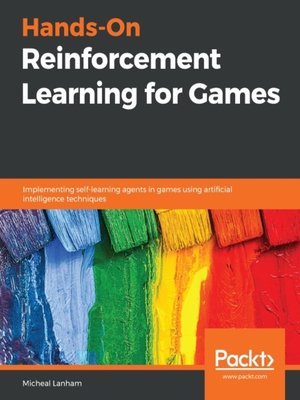Hands-On Reinforcement Learning for Games
ebook ∣ Implementing self-learning agents in games using artificial intelligence techniques
By Micheal Lanham

Sign up to save your library
With an OverDrive account, you can save your favorite libraries for at-a-glance information about availability. Find out more about OverDrive accounts.
Find this title in Libby, the library reading app by OverDrive.



Search for a digital library with this title
Title found at these libraries:
| Library Name | Distance |
|---|---|
| Loading... |
Explore reinforcement learning (RL) techniques to build cutting-edge games using Python libraries such as PyTorch, OpenAI Gym, and TensorFlow
Key FeaturesWith the increased presence of AI in the gaming industry, developers are challenged to create highly responsive and adaptive games by integrating artificial intelligence into their projects. This book is your guide to learning how various reinforcement learning techniques and algorithms play an important role in game development with Python.
Starting with the basics, this book will help you build a strong foundation in reinforcement learning for game development. Each chapter will assist you in implementing different reinforcement learning techniques, such as Markov decision processes (MDPs), Q-learning, actor-critic methods, SARSA, and deterministic policy gradient algorithms, to build logical self-learning agents. Learning these techniques will enhance your game development skills and add a variety of features to improve your game agent's productivity. As you advance, you'll understand how deep reinforcement learning (DRL) techniques can be used to devise strategies to help agents learn from their actions and build engaging games.
By the end of this book, you'll be ready to apply reinforcement learning techniques to build a variety of projects and contribute to open source applications.
What you will learnIf you're a game developer looking to implement AI techniques to build next-generation games from scratch, this book is for you. Machine learning and deep learning practitioners, and RL researchers who want to understand how to use self-learning agents in the game domain will also find this book useful. Knowledge of game development and Python programming experience are required.







